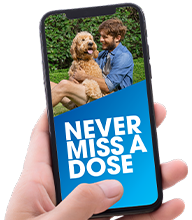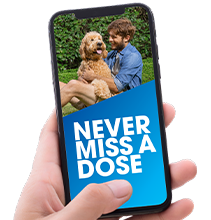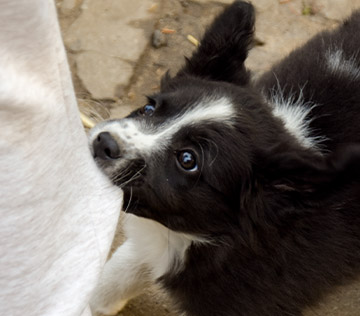
Bite Inhibition
Bite inhibition refers to your puppy’s ability to control the force of their bite and mouthing as they play and explore. Without learning this skill, your puppy will not know how to regulate their biting, resulting in undesirable behaviour. Without bite inhibition your puppy has no concept of the sensitivity of human skin, meaning they may bite too hard, even when they are playing. Puppies learn bite inhibition from interactions early in life with their mother and siblings. You can also support your puppy’s development in this area during your play sessions by redirecting hard mouthing and positively reinforcing your puppy when they use a soft mouth. Encouraging your puppy to use their mouth more gently will not only benefit you, but it will help them as they socialise with other people and animals in future.
How to Stop a Puppy Play Biting
As you play with your puppy, you will notice the way they nip and bite. There are a few ways to stop a puppy from biting when excited or playing which can help to prevent aggressive puppy play. If rough play continues or escalates, it is likely that you will require the assistance of a qualified force-free trainer or behavioural veterinarian to address it. Some of the ways to stop your puppy biting involve providing products that they can comfortably bite and explore, like toys for puppies. In using these, you can redirect your puppy to an appropriate object when they go to bite your fingers or toes, reinforcing the message that these body parts are not for biting. If your puppy is jumping and biting you can redirect them by giving them something else to do to help them settle. Interactive food toys that encourage licking and chewing are great for this. You can also reinforce your puppy with calm praise and treats when they have their paws on the floor or are sitting instead of jumping up. Attending puppy training classes run by a qualified force-free trainer is a great way to assist you in working on helpful foundation skills and impulse control with your puppy. Whatever you do, ensure that you reinforce your puppy with positive experiences so that they can make the connection and extend their learning.
How to Discipline a Puppy for Biting
You should not discipline your puppy for biting as using punishment is confusing and scary for them and can also damage the bond between you. You can utilise concepts like a puppy time out in a positive way in order to help your puppy calm down and stop mouthing you. This should not be seen as a punishment, but instead as an opportunity for your puppy to spend time in their pen or crate with a long-lasting source of enrichment. Providing interactive food toys that encourage licking and chewing will help your puppy to relax and feel content, with the added bonus of giving you a break. Make sure that you are calm and patient, so that your puppy does not feel entrapped or ‘punished.’ Once they have had the opportunity to relax and engage in a positive and calming activity, let them back out to continue interactions. When you are investigating how to stop your puppy biting, remember that a gentle, positive approach will be far more successful than aggressive strategies as these will help to foster positive emotions while reinforcing the connection you have with your puppy.
Positive Puppy Training
Positive reinforcement puppy training is a great strategy when you are looking for ways to stop puppy biting. Working on the basis that dogs repeat behaviours that provide them with what they want, positive reinforcement training focuses on rewarding your puppy for the behaviours you want to encourage. It can be easy to overlook times when your dog is calm and quiet. Offering positive reinforcement at these times can help your puppy make the connection between displaying these behaviours and a positive experience, rather than when they become overexcited and bite, resulting in no treat or praise. Using positive reinforcement can begin in small steps that then gradually builds up to a consistent training routine that you follow each day.
Puppy Training Classes
There are trained professionals who can provide puppy training classes to support you in your search for ways to stop your puppy biting. A qualified force-free trainer can help you implement a behaviour modification plan and show you different strategies that address their biting. Depending on the behaviours your puppy is showing, the trainer can devise a personalised training plan to address your particular concerns. It is important that your puppy receives the care and attention they need to address any problems or concerns that you may have as soon as possible.
FAQs
-
When Do Puppies Stop Biting?
There is no one size fits all answer for puppy biting. Often, puppies bite because they are exploring the world around them, teething or playing. Your puppy could have their full set of adult teeth at approximately seven months of age at which point mouthing may reduce, whereas play biting is a phase that if managed carefully can resolve while your puppy is still a young dog.
-
Why Do Puppies Bite?
Puppies, just like human infants, use their mouths to explore the new environments around them. They nip and bite as they play, and they bite different objects to better understand them. Puppies also use biting as a form of relief for the teething pain that occurs through the first several months of their lives. While most biting and nipping behaviour is normal and to be expected, some puppies can bite out of fear or frustration, which can indicate potential problems in the future. Knowing strategies to stop your puppy biting can help to mitigate these potential problems before they occur.
-
How to Stop a Puppy Biting Furniture
Knowing how to stop your puppy from biting the furniture can help to protect your belongings from further damage. It is important to watch and oversee your pup to make sure they are saved from their own curiosity and prevented from putting everything in their mouth. It can also help to confine your puppy to approved spaces, particularly if you need to leave them alone for periods of time. Be mindful to set up the environment in order to set your puppy up for success. Restrict their access to things you do not want them to have access to. For example, you can use baby gates to create zones in the house to ensure your puppy does not have unsupervised access to particular rooms. Store away anything that your puppy may find and chew that you do not want damaged. Make sure to provide your puppy with things they can chew so that they have the opportunity to exhibit normal canine behaviour. It is also helpful to ensure that your puppy is getting enough physical exercise as well as mental stimulation. Avoid boredom and high energy levels which can lead to more biting by providing enough exercise to meet their needs.
CAN-0071-2022
Related Articles
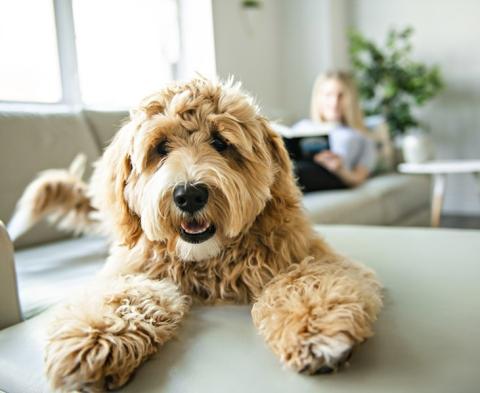

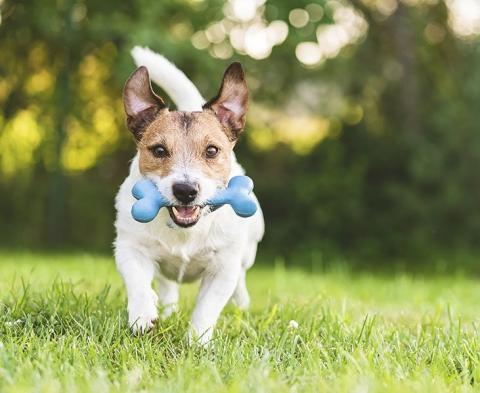

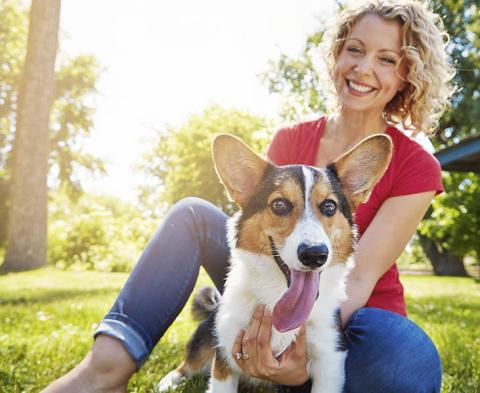

Copyright and Trademark Notice
NEXGARD SPECTRA®, NEXGARD®, HEARTGARD30® and PARAGARD® are registered trademarks of the Boehringer Ingelheim Group.
©2021-2022 Boehringer Ingelheim Animal Health Australia Pty. Ltd. All rights reserved. PET-0228-2022

